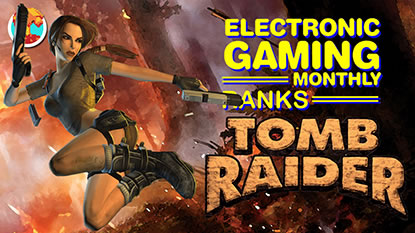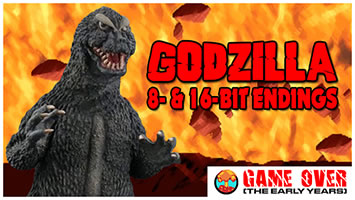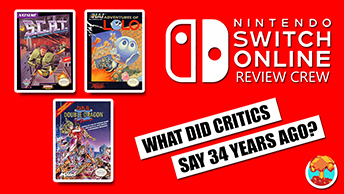- CLASSIC MAGAZINES
- REVIEW CREW
A show recapping what critics thought back
when classic games first came out! - NEXT GENERATION'S BEST & WORST
From the worst 1-star reviews to the best
5-stars can offer, this is Next Generation! - NINTENDO POWER (ARCHIVE)
Experience a variety of shows looking at the
often baffling history of Nintendo Power! - MAGAZINE RETROSPECTIVE
We're looking at the absolutely true history of
some of the most iconic game magazines ever! - SUPER PLAY'S TOP 600
The longest and most ambitious Super NES
countdown on the internet! - THEY SAID WHAT?
Debunking predictions and gossip found
in classic video game magazines! - NEXT GENERATION UNCOVERED
Cyril is back in this spin-off series, featuring the
cover critic review the art of Next Generation! - HARDCORE GAMER MAGAZING (PDF ISSUES)
Download all 36 issues of Hardcore Gamer
Magazine and relive the fun in PDF form!
- REVIEW CREW
- ELECTRONIC GAMING MONTHLY
- ELECTRONIC GAMING MONTHLY RANKS
From Mario to Sonic to Street Fighter, EGM
ranks classic game franchises and consoles! - ELECTRONIC GAMING MONTHLY BEST & WORST
Counting down EGM’s best and worst reviews
going year by year, from 1989 – 2009! - ELECTRONIC GAMING BEST & WORST AWARDS
11-part video series chronicling the ups and
downs of EGM’s Best & Worst Awards!
- ELECTRONIC GAMING MONTHLY RANKS
- GAME HISTORY
- GAME OVER: STORY BREAKDOWNS
Long-running series breaking down game
stories and analyzing their endings! - A BRIEF HISTORY OF GAMING w/ [NAME HERE]
Real history presented in a fun and pithy
format from a variety of game historians! - THE BLACK SHEEP
A series looking back at the black sheep
entries in popular game franchises! - INSTANT EXPERT
Everything you could possibly want to know
about a wide variety of gaming topics! - FREEZE FRAME
When something familiar happens in the games
industry, we're there to take a picture! - I'VE GOT YOUR NUMBER
Learn real video game history through a series
of number-themed episodes, starting at zero! - GREAT MOMENTS IN BAD ACTING
A joyous celebration of some of gaming's
absolute worst voice acting!
- GAME OVER: STORY BREAKDOWNS
- POPULAR SHOWS
- DG NEWS w/ LORNE RISELEY
Newsman Lorne Riseley hosts a regular
series looking at the hottest gaming news! - REVIEW REWIND
Cyril replays a game he reviewed 10+ years
ago to see if he got it right or wrong! - ON-RUNNING FEUDS
Defunct Games' longest-running show, with
editorials, observations and other fun oddities! - DEFUNCT GAMES QUIZ (ARCHIVE)
From online quizzes to game shows, we're
putting your video game knowledge to the test!- QUIZ: ONLINE PASS
Take a weekly quiz to see how well you know
the news and current gaming events! - QUIZ: KNOW THE GAME
One-on-one quiz show where contestants
find out if they actually know classic games! - QUIZ: THE LEADERBOARD
Can you guess the game based on the classic
review? Find out with The Leaderboard!
- QUIZ: ONLINE PASS
- DEFUNCT GAMES VS.
Cyril and the Defunct Games staff isn't afraid
to choose their favorite games and more! - CYRIL READS WORLDS OF POWER
Defunct Games recreates classic game
novelizations through the audio book format!
- DG NEWS w/ LORNE RISELEY
- COMEDY
- GAME EXPECTANCY
How long will your favorite hero live? We crunch
the numbers in this series about dying! - VIDEO GAME ADVICE
Famous game characters answer real personal
advice questions with a humorous slant! - FAKE GAMES: GUERILLA SCRAPBOOK
A long-running series about fake games and
the people who love them (covers included)! - WORST GAME EVER
A contest that attempts to create the worst
video game ever made, complete with covers! - LEVEL 1 STORIES
Literature based on the first stages of some
of your favorite classic video games! - THE COVER CRITIC
One of Defunct Games' earliest shows, Cover
Critic digs up some of the worst box art ever! - COMMERCIAL BREAK
Take a trip through some of the best and
worst video game advertisements of all time! - COMIC BOOK MODS
You've never seen comics like this before.
A curious mix of rewritten video game comics!
- GAME EXPECTANCY
- SERIES ARCHIVE
- NINTENDO SWITCH ONLINE ARCHIVE
A regularly-updated list of every Nintendo
Switch Online release, plus links to review! - PLAYSTATION PLUS CLASSIC ARCHIVE
A comprehensive list of every PlayStation
Plus classic release, including links! - RETRO-BIT PUBLISHING ARCHIVE
A regularly-updated list of every Retro-Bit
game released! - REVIEW MARATHONS w/ ADAM WALLACE
Join critic Adam Wallace as he takes us on a
classic review marathon with different themes!- DEFUNCT GAMES GOLF CLUB
Adam Wallace takes to the links to slice his way
through 72 classic golf game reviews! - 007 IN PIXELS
Adam Wallace takes on the world's greatest spy
as he reviews 15 weeks of James Bond games! - A SALUTE TO VAMPIRES
Adam Wallace is sinking his teeth into a series
covering Castlevania, BloodRayne and more! - CAPCOM'S CURSE
Adam Wallace is celebrating 13 days of Halloween
with a line-up of Capcom's scariest games! - THE FALL OF SUPERMAN
Adam Wallace is a man of steel for playing
some of the absolute worst Superman games! - THE 31 GAMES OF HALLOWEEN
Adam Wallace spends every day of October afraid
as he reviews some of the scariest games ever! - 12 WEEKS OF STAR TREK
Adam Wallace boldly goes where no critic has
gone before in this Star Trek marathon!
- DEFUNCT GAMES GOLF CLUB
- DAYS OF CHRISTMAS (ARCHIVE)
Annual holiday series with themed-episodes
that date all the way back to 2001!- 2015: 30 Ridiculous Retro Rumors
- 2014: 29 Magazines of Christmas
- 2013: 29 Questionable Power-Ups of Christmas
- 2012: 34 Theme Songs of Christmas
- 2011: 32 Game Endings of Christmas
- 2010: 31 Bonus Levels of Christmas
- 2009: 30 Genres of Christmas
- 2008: 29 Controls of Christmas
- 2007: 34 Cliches of Christmas
- 2006: 33 Consoles of Christmas
- 2005: 32 Articles of Christmas
- 2004: 31 Websites of Christmas
- 2003: 29 Issues of Christmas
- 2002: 28 Years of Christmas
- 2001: 33 Days of Christmas
- NINTENDO SWITCH ONLINE ARCHIVE
- REVIEW ARCHIVE
- FULL ARCHIVE
FAQ: Cyril Explains it All! Part 2

Thank god these two morons didn't have any questions for me, I would hate to have to answer a giant pizza slice!
After re-reading this three year old article I realized that I was largely right about my predictions and decisions. As I beat my chest and did a victory dance I decided that if I was right once then maybe it's time for me to try again and answer a few more burning questions. So that's exactly what I'm going to do here, I'm going to grab ten of the most important questions and give you my take. Forget about doing your own research and coming up with a conclusions, there's no reason to exert such energy when you can just read what I have to think and take my opinions as fact.
In this very special article we will take a look at everything from the PSP's pricing, Rare's recent output, the Wii's audience, the amount of shooters on the Xbox 360, those blasted Friend Codes and so much more. Over the next five pages you will discover the truth and learn what you need to tell people if they ask you any of these important questions. But enough stalling, isn't it about time you discovered FAQ: Cyril Explains It All! Part 2? Yeah, that's what I thought ... so get on with it, scroll down and enjoy the first two questions in this life changing article.
Did Rockstar doom their PSP Grand Theft Auto Games by Releasing them on the PS2?

The Situation: Fans and critics all agreed, the fact that Rockstar Games was able to fit Grand Theft Auto: Liberty City Stories onto the PSP was an impressive feat. Never before had we seen a portable Grand Theft Auto game that looked and played just like the console counterparts, and even if it had a few minor problems (some control issues, lame music, a boring location) people were ready to accept its faults and simply be impressed by what the company was able to pull off. Perhaps that's one of the reasons why it was so popular all the way through 2005, proving to be the best selling PSP game of all time.
Early in 2006 Rockstar announced that they were going to port this top selling game to the PS2 for a fraction of the price, something that opened up the game to a completely different

Later that year Rockstar released Vice City Stories only to find that their hard work didn't pay off. Thanks to the low price tag Liberty City Stories continued to outsell Vice City Stories and a lot of people who would have normally bought the brand new PSP game decided to hold off until the inevitable release on the PlayStation 2. One is left to assume that a good number of the people who bought Rockstar's first PSP Grand Theft Auto game decided to wait a few months to buy the PlayStation 2 version of Vice City Stories for a discounted price. By rushing to cash in on the game Rockstar shot themselves in the foot and ended up hurting the PSP in the process.

The Solution: Next time you release a brand new game on the PSP make sure it stays exclusive to the console for at least a year, that way gamers aren't tempted to just sit out the next PSP release and wait for the PlayStation 2 version. It would also have been a good idea if Rockstar had spent an extra six months working on a brand new location, Grand Theft Auto fans like it when they have a new city to explore. And for what it's worth, that $50 price tag has got to go, especially when the PlayStation 2 version comes out at $19.99. Rockstar has nobody to blame but themselves.
Will Nintendo Ever Do Away With Friend Codes?

The Situation: After years of saying no to online gaming, Nintendo of America shocked the entire world when they announced that they would allow people to go online with the Nintendo DS and games like Mario Kart DS and Animal Crossing. Fans, journalists and pretty much anybody who loves video games unanimously agreed that this was a great idea, hopefully opening up the idea of online Wii games. Unfortunately the excitement was short lived thanks to Nintendo's use of Friend Codes.
A Friend Code is a 12 to 16 digit number that works as your own personal identity in Nintendo's various WiFi games. The problem is that the codes change per game and are hard to distribute. Most people's first experience with the Friend Codes came with Mario Kart DS, a game that didn't allow any kind of communication at all. In

The media reaction to the Friend Codes were understandably negative, nobody likes to jump through hoops when it comes to playing games online. But apparently Nintendo didn't learn their lesson because Friend Codes are a vital part to the Wii community. At first gamers were willing to give Big N the benefit of the doubt, believing that the Friend Code would be system specific and not based on what game you had. Unfortunately that is not the case, each online Wii game has its own unique Friend Code, which means that we're dealing with exactly the same problem we had with the Nintendo DS.
In the past Nintendo has justified the Friend Codes by explaining that it's for the younger gamers' safety. Apparently Nintendo worries that online predators will use their DS to track down innocent children and kidnap them. So far this has not been an epidemic with the Xbox Live or PlayStation Online service, but it's the kind of thing Nintendo is worried about. The Chris Hansen in all of us thanks Nintendo, but at the same time most of us are just frustrated by the way this service works. Nobody likes to memorize a dozen digits, especially when there are different codes for different games. We will have to wait and see how this ultimately affects the Wii's online community, but for now it's safe to say that most gamers would like to see an end to the Friend Code.

The Solution: You would think that the smart people over at Nintendo could come up with a way to both protect the younger gamers and make it easy for people that want to play together. The idea of protecting younger eyes and ears from the hate filled content that permeates in online gaming is a good one, but it's all about balance. You can't base your entire online plan around the small percentage of people who may be kidnapped or see something they shouldn't be exposed to. I'm afraid if Nintendo continues on this Friend Code path they are bound to pull in only modest numbers and incorrectly conclude that we aren't interested in online gaming. I love the idea of playing games online, I just hate memorizing several different 16 digit codes.
HOME |
CONTACT |
NOW HIRING |
WHAT IS DEFUNCT GAMES? |
NINTENDO SWITCH ONLINE |
RETRO-BIT PUBLISHING
Retro-Bit |
Switch Planet |
The Halcyon Show |
Same Name, Different Game |
Dragnix |
Press the Buttons
Game Zone Online | Hardcore Gamer | The Dreamcast Junkyard | Video Game Blogger
Dr Strife | Games For Lunch | Mondo Cool Cast | Boxed Pixels | Sega CD Universe | Gaming Trend
Game Zone Online | Hardcore Gamer | The Dreamcast Junkyard | Video Game Blogger
Dr Strife | Games For Lunch | Mondo Cool Cast | Boxed Pixels | Sega CD Universe | Gaming Trend
Copyright © 2001-2025 Defunct Games
All rights reserved. All trademarks are properties of their respective owners.
All rights reserved. All trademarks are properties of their respective owners.
























